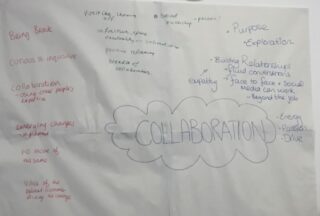 I recently joined a group of 12 Q members on a skills workshop visit to Prostate Cancer UK to learn from their experiences and experiments in using Appreciative Inquiry for improvement.
I recently joined a group of 12 Q members on a skills workshop visit to Prostate Cancer UK to learn from their experiences and experiments in using Appreciative Inquiry for improvement.
The day was led by Lauren Wiggins and Heather Blake (who are Deputy Director and Director of Support and Influencing at Prostate Cancer UK – I love those titles!).
Prostate Cancer UK have a mission to ‘tame prostate cancer in 10 years’ – reversing the upward trend and reducing the life-changing side-effects. They do this by funding research, driving change through influence, education and campaigns – and providing support to men and families, particularly around the topic of treatment choices.
With their recent merger with Prostate Action, the theme of ‘collaboration’ has been particularly important to them, and was the focus of an organisational change programme. The question they kept asking themselves was ‘how do we do this well?’. Lauren’s exposure to Appreciative Inquiry and her mental health nursing background was sufficient for her to be ’10% braver’, and take a proposal to the board to use Appreciative Inquiry to support this change programme.
Appreciative Inquiry asks “what is the thing we want to get more of?” rather than “what’s the problem?”.
So what is Appreciative Inquiry? Lauren explained that it’s not just ‘positive thinking’ or a ‘Pollyanna’ mindset. She described it as “The art of recognition and enhancing value” coupled with “Exploration and discovery – a quest.”
 Appreciative Inquiry asks “what is the thing we want to get more of?” rather than “what’s the problem?”.
Appreciative Inquiry asks “what is the thing we want to get more of?” rather than “what’s the problem?”.
As improvement professionals, I guess we’re easily prone to look for problems to fix, rather than build on strengths. It kind of comes with the territory – so all the more reason for a bit of a re-set with the philosophical approach behind Appreciative Inquiry (AI).
What is Appreciative Inquiry?
One of the most succinct explanations of AI that I have seen is actually in this 3-minute Dove Soap Commercial – ‘You’re more beautiful than you think’ Do watch it!
Lauren explained the five stages of an Appreciative Inquiry ‘summit’ or ‘cycle’
- Definition – Identifying the thing we want to improve.
- Discovery – in your context, taking a deep dive into what enables ‘what we want to happen’. Using stories and examples of what it feels like when we do this really well.
- Dream – Gaining clarity as if you have lived it. More than just a fantasy of what you’d like to see – something based on reality because it draws on real stories.
- Design – identifying ‘what are the ideals’ that you could work on (rather than just the ideal future)
- Destiny – recognising that we can’t control everything. So what can I act on now that will shape the future.
How did they make it happen?
The group asked Lauren and Heather about the engagement of leaders and staff in the process – how to make it happen.
The first question from the senior team was “how are we going to measure this?”. Lauren had to manage their expectations and explain that the process is something of a quest. The executives wanted to nominate people for the approach, but Lauren held her ground and insisted on volunteers – open access – people with an inherent curiosity.
She positioned it with the request: “Please sign up. This is optional – We are experimenting with something different”.
The CEO came to the first session, important for role-modelling and leading by example. It made a huge difference. In Laurens words: “We had so much fun and generated so much energy. All voices were considered equal because it was a new process”.
The initial group generated a series of insights around how to be more collaborative – and took personal actions to start working differently. Themes were summarised and shared with the whole organisation – and ultimately built into staff conferences and L&D programmes.
The workshop
Having heard the Prostate Cancer UK story, we were invited to try the process ourselves.
Our ‘Discovery’ question was: “Think back to a time when you experienced great collaboration for achieving patient-centred improvement in action.”
We paired up, sharing examples and listening – really listening – to each other. Pairs then clustered with other pairs and looked for common themes. The themes from each group were then shared back on a large poster:

To communicate our Dream, we were given a variety of creative materials – and the freedom to act our dream out.


We reflected individually on our design and destiny stages and wrote ourselves a challenge – a postcard congratulating ourselves on a change we had made. These were collected and will be sent to us in six weeks’ time.
All in all – a day to appreciate.
For another perspective on the visit you can also read a blog by Q Programme Manager, Dimple Davé.
Further information about the visit to Prostate Cancer UK along with some handy resources can be found on the Q visits page.